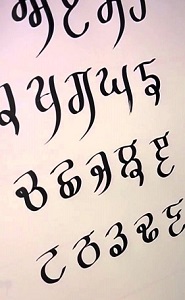The Investiture Day of the Khalsa as the Army of the Timeless Being
Khalsa Akal Purakh ki Fauj
Khalsa Akal Purakh ki Fauj
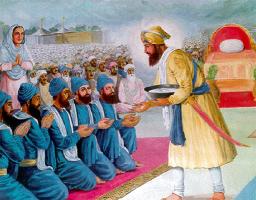
The revelation of the order of Khalsa (pragtio Khalsa) was the climax of all that had gone before and the inspiration of all that was to follow.
Two hundred years after Guru Nanak (1469-1539) laid down the founding precepts for New Age ideology and institutions, Guru Gobind Singh completed that mission on the Vaisakhi day in 1699.
At Anandpur in Panjab, Guru Gobind Singh presented the final form of a transcaste egalitarian order. The Guru looked on with satisfaction at the first five Sikhs who had risen above the fear of death, and who were prepared to tread the path of truthful conduct. They had offered their heads to the Guru and the Guru had given them a new identity and way of life, and embraced them as the Five Beloved Ones (Panj Piaray). They had qualified for admission to the fully evolved order of the Khalsa Panth. They were ready to accept the spiritual and worldly discipline of Sikhism as responsible householders and social activists. Today, the Panj Piaray (the Five Beloved Ones) represent the ideal of service and sacrifice towards which every Sikh, the after truth, aspires.
Thus, having completed Guru Nanak's mission, Guru Gobind Singh, returned the Guruship from human succession back to the Guru's Word i.e. Gurbani embodied in Guru Granth Sahib (the Sikh Holy Scripture). The collective body of the Khalsa Panth or the Sikh Holy Congregation (sangat) in the presence of Guru Granth Sahib, represented the physical form of the Guru, as Guru Khalsa Panth.
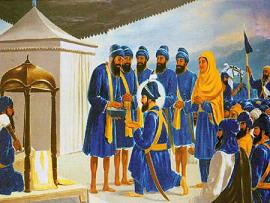
The joint Guruship of Guru Granth and Guru Panth is a unique feature of Sikh tradition. It means that collectively, the Sikhs are empowered by the Guru to interpret the Guru's Word in Guru Granth Sahib. The Guru has given us the constitution, Guru Granth Sahib, and the egalitarian and democratic institutions to work together towards an ideal just society, united in its diversity.
It is in this sense that it may be said that Sikhi (Sikh Religion) is truly a religion of the people, by the people and for the people!
Khalsa Vaisakhi Day is also the time to reflect on the challenges faced by the independent Khalsa ideology, institutions and identity. As late Sirdar Kapur Singh reminded us, the independent status and the prerogatives of the Khalsa are imprescriptible. (The Golden Temple: Its Theo-political Status)
It is in that true Khalsa spirit that we should celebrate the Khalsa Vaisakhi Day on 14 April 2026.
For further information -
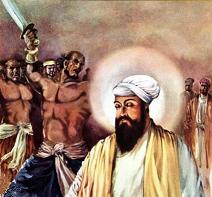
Year 2025 marks the 350th Shaheedi (martydom) anniversary of Nanak IX, Guru Tegh Bahadur Ji (24 November 2025).
To commemorate the life, mission and martyrdom of Guru Ji, the Society's acclaimed publication Guru Tegh Bahadur (1621-1675): The True Story* has been revised and updated with Guru Ji's Gurbani by Society sewadar, S. Gurmukh Singh OBE. The Digital Edition has been made available to diaspora Sikh organisations for publication.
(* The study, reviewed by renowned scholar, Dr Hardev Singh Virk, has one of the highest “reads” score of over 60,500 on ResearchGate.)
The Sikh Missionary Society (U.K.) is a charity. Our registered charity number is 262404. We are regulated by the Charity Commission to whom we are required to submit our annual report and financial statements, up-to-date information about our trustees and other administrative information.
Our annual reports are available to view-
We are pleased to inform the Sangat that the work on the construction of the new hall is now complete.
Due to the Covid-19 restrictions it was quite a difficult task but with the blessings of Guru ji, all the work has now been satisfactorily completed. Some changes were made to the original plan and also due to some extra work the final costs increased. Hence we appeal for donations, please consider to help support this effort -
Current Affairs advisories from Sardar Gurmukh Singh OBE, Chair of the Sikh Missionary Society Advisory Board -
Further Reading
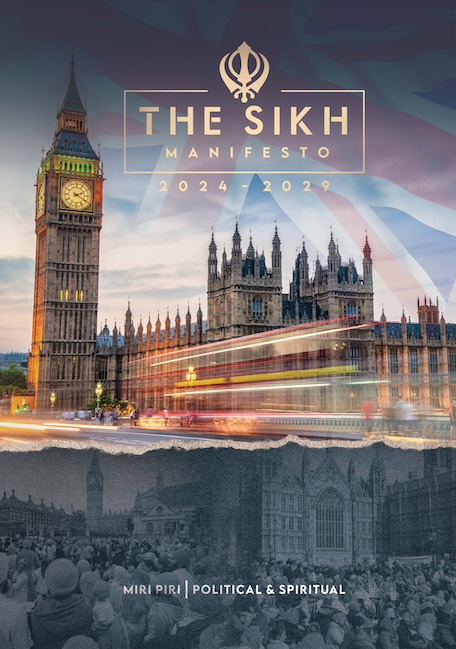
UK General Election Sikh Manifestos: In addition to British Sikh issues, the Manifestos provide compact information about Sikh Identity, Kakaars, Anglo-Sikh history and heritage
Sikhs worldwide remember the 1984 pogrom in which, according to official figures, at least 3,000 Sikhs were killed by organized mobs in Delhi in the first 3 days of November 1984. Thousands of Sikhs were also killed in other cities of India. While the terror of the human slaughter within such a short time was horrifying, the contrived completeness of the failure of the Indian administrative system was inexcusable.
Pogroms, genocides and human tragedies, should unite all right thinking, fair-minded people above communal and religio-ethnic divides so that lessons are learnt, and history does not repeat itself. The politics of forgetfulness must not be allowed to suppress the traditional Sikhi spirit of remembrance expressed in the daily Ardaas (supplication).

In an ever shrinking world, no one can remain immune from large scale selective massacre of one community and prolonged delay in the delivery of justice. We remember those who lost their lives in the Sikh genocide of November 1984 and their families who continue to be denied justice to this day.
Further Reading
The British Sikh Inquiry (BSI) project aims to record evidence which shows institutional bias against the Sikhs because they are “different”. Thus, “Institutional racism” was defined by Sir William Macpherson in the UK’s Lawrence report (1999) as:
“The collective failure of an organization to provide an appropriate and professional service to people because of their colour, culture, or ethnic origin. It can be seen or detected in processes, attitudes and behaviour that amount to discrimination through prejudice, ignorance, thoughtlessness, and racist stereotyping which disadvantage minority ethnic people.”
Institutional racism in the government and agencies, politics, local and national assemblies, the judiciary, the media, the health and educational systems and other public and private sector bodies is directed against a people like the Sikhs because they are seen to be “different”. They are different not just because of their visible identity in case of Amritdhari (initiated) Sikhs and Sikhs who keep turbans and beards but also due to their association with a way of life based on creed, culture and historical tradition as a distinct people.
There have been numerous recorded cases since the arrival of Sikhs in the UK from about mid-1950's, which show that Sikhs have been victims of institutional discrimination because of their qaumi (theo-national) way of life, values, behaviour and characteristics. Varying degrees of religious observance may be one characteristic.
Otherwise, “The Sikhs are a role model community and provide an exceptionally interesting example of successful integration whilst maintaining a very visible and distinctive religious identity.” (The Sikh Manifesto 2015-2020).
Findings of the prolonged Daniel Morgan murder investigation into Scotland Yard remind UK Sikhs of their own negative experience in dealing with public servants and ministers. The most recent example is the highly questionable "consultation" process used by the Office for National Statistics to decide if the Sikhs should be allocated own ethnic (Qaumi) tick box in Census 2021.
The British Sikh Inquiry (BSI) section at the Sikh Missionary Society UK aims to collate and preserve as part of British Sikh history, cases, news reports, briefings and investigative articles relating to institutional racism against British Sikhs as a distinct community in the British plural society.
Project co-ordinator:
Gurmukh Singh OBE: sewauk2005@yahoo.co.uk
(First contact by e-mail only).
Please visit the new section of the website -
Achieving this Guidance on the wearing of Sikh Articles of Faith in the workplace and public spaces by the Equalities and Human Rights Commission (EHRC) is an important step forward in recognition of the Sikh religious identity in the UK. The Sikh Missionary Society UK was represented by Gurmukh Singh (UK) in the drafting of the Equality and Human Rights Commission guidelines.
You should read this guidance if you require:

Further Reading
Sections 11 and 12 of the Employment Act 1989 as amended by Section 6 of the Deregulation Act 2015 exempts turban-wearing Sikhs from any legal requirement to wear head protection at a workplace.
To Produce and distribute books on the Sikh Faith in English and Panjabi, and other languages to enlighten the younger generation of Sikhs as well as non-Sikhs.
To Advise and support young students in schools, colleges and universities on Sikh issues and Sikh traditions. If you belong to an educational institution and would like more information on Sikhism please contact the Resource Centre.
To Arrange Classes, Lectures, Seminars, Conferences, Gurmat camps and the celebration of Holy Sikh Events.
To award prizes to children on the basis of their achievement and interest in the field of Sikh Faith and Panjabi Language.
To make available all Sikh Artefacts, Posters, Literature, Music, Educational Video's, DVD's and Multimedia CD-ROMs
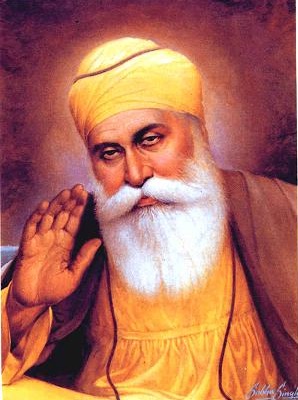
The Sikh Missionary Society U.K seeks financial and other help from Sikh Sangats and Gurdwaras to meet the objectives of the Society. The Society also acts as a Sikh Resource Centre and has over 1000 life and ordinary members from all over the U.K and abroad.
Catalogue of books and artefacts available at the Sikh Missionary Society UK
Today in Sikh History:
Read about the Sikh Missionary Society, its background History, activities and the managing committee. Learn more...
Browse our Book, Audio and Video library and read publications and articles in our Resource Centre. Learn more...
Find out more about hiring the Mata Sahib Hall for Birth, Engagement, Marriage, Akhand Path, Sehaj Path and more Learn more...
